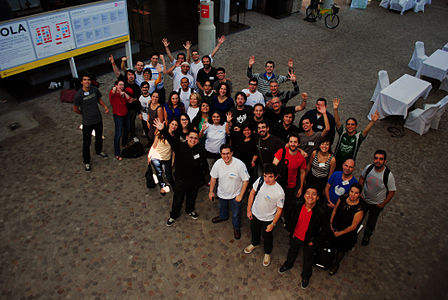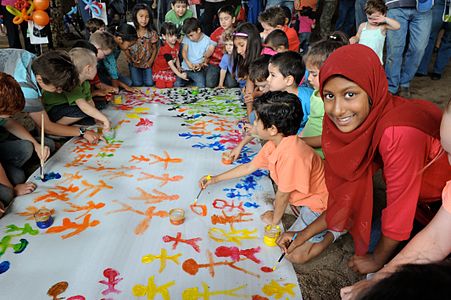Learning and Evaluation/Newsletter/2015/1/3/da
blogs, events
& more!
on Meta!
The Wikipedia Education Collaborative is a group of international education program leaders who volunteer to share experiences and support other education programs in achieving their goals.
Learn more about Wikipedia Education Collaborative:
The Wikipedia Education Program aims to bring Wikipedia into educational contexts all over the world. The idea behind it is simple: encourage educators and students all over the world to contribute to the free encyclopedia and its sister projects.
This idea quickly sparked innovation in many different countries: education program leaders, each with the same goal, decided to approach the challenge in different ways; Wikipedia in the classroom, university assignments, school clubs, teacher training courses, and many more initiatives soon became a common currency in the Wikimedia world.
With many different ways to run and support education programs, the idea of a Wikipedia Education Collaborative emerged as a group of individuals aiming at supporting Wikipedia in education. The goals of this group include: sharing best practices in educational outreach, collecting new ideas for educational initiatives, sharing resources among global programs, recognizing the efforts of programs and leaders, and mentoring newer educational initiatives.
Members of the Collaborative represent a diverse set of programs, languages, and geographies as well as experiences and opinions. Reach out to them to ask for information, help, and advice. If you have experience running or participating in a Wikipedia Education Program, you can join too!
Conferences, hackathons, meet ups… International gatherings have been in the spotlight in the last year. Why do we need to physically cross borders in the Wikimedia movement? How effective are these international gatherings?
Read what happened at Iberoconference 2014:
|
The IV Annual Conference of Wikimedia in Ibero America took place in Buenos Aires, from November 21-23. This conference marked a breakthrough compared to previous issues, as it set the foundations for a regional strategy of the movement. The occasion not only served to set goals, but also had a strong emphasis in Program Evaluation and Strategic Design. Read more: |
New evaluation reports on Travel support and Wikimania:
|
Conferences and hackathons had been identified as key programs to develop evaluation insight. As they become more popular in the movement, there is a growing demand to understand their impact, utility and reason. To that end, during 2014 several community members have put effort to produce evaluation reports on conferences, and also on Travel and Participation Support (TPS). Check out the results of these collaborative efforts! |
blogs, events & more!
Read our blogposts
Every month, we share knowledge with a focus on programs, process or tools on Wikimedia Foundation's blog. Find all our entries on the Wikimedia blog
Featured blog posts:
'New Learning Series: Telling your program’s story’
If you are a program or project leader and struggle to get your story across in reporting, this is your chance to learn tricks and gather resources to tell a better story. Through some key strategies you can improve not only the way you share about your efforts, but the impact of the work in advancing the movement and how others might benefit from such efforts.
'How to get Wikimedia Foundation to fund your international gathering’ After the first Wikimania was organized in Frankfurt, Germany in 2005, it was clear that alongside the virtual channels that we rely on every day, Wikimedia community members are in need of physical meeting spaces. They allow to build stronger networks of trust and friendship, share experiences, and create new ideas with peers from all across the globe.
| January
| ||||||
| Mon | Tue | Wed | Thu | Fri | Sat | Sun |
| 1 | 2 | 3 | 4 | |||
| 5 | 6 | 7 | 8 | 9 | 10 | 11 |
| 12 | 13 | 14 | 15 | 16 | 17 | 18 |
| 19 | 20 | 21 | 22 | 23 | 24 | 25 |
| 26 | 27 | 28 | 29 | 30 | 31 | |
January 15: WMF asses eligibility for Annual Plan Grants.
| February
| ||||||
| Mon | Tue | Wed | Thu | Fri | Sat | Sun |
| 1 | ||||||
| 2 | 3 | 4 | 5 | 6 | 7 | 8 |
| 9 | 10 | 11 | 12 | 13 | 14 | 15 |
| 16 | 17 | 18 | 19 | 20 | 21 | 22 |
| 23 | 24 | 25 | 26 | 27 | 28 | |
February 15: Diversity Learning patterns campaign: Learning and Evaluation team is launching a campaign to expand knowledge around diversity outcomes. Join us!
February 16: Wikimania 2015: deadline to apply for a scholarship to attend the conference.
February: Watch our News page for upcoming hangout topics! These will include Education program toolkit and photo events.
| March
| ||||||
| Mon | Tue | Wed | Thu | Fri | Sat | Sun |
| 1 | ||||||
| 2 | 3 | 4 | 5 | 6 | 7 | 8 |
| 9 | 10 | 11 | 12 | 13 | 14 | 15 |
| 16 | 17 | 18 | 19 | 20 | 21 | 22 |
| 23 | 24 | 25 | 26 | 27 | 28 | 29 |
| 30 | 31 | |||||
March 4: IEG+PEG: Inspire Campaign launches. Accepting ideas and grant proposals to impact the gender gap!
A program in the spotlight.
How to integrate GLAM and Education program: Barcelona Design Museum
Wikiproject:Design Museum in Barcelona started in 2011, when the Design Hub in Barcelona (formed by the Museu de les Arts Decoratives, Museu Tèxtil i d'Indumentària, Gabinet de les Arts Gràfiques and Casa Bloc) decided to transfer its collection to a new building in Plaça de les Glòries, and form in this way the new Museum that would group them all: Design Museum of Barcelona. The idea back then was to have all museums that form the hub represented on Wikipedia. However, the project brought more than just a major GLAM outreach opportunity.
In 2013 and 2014, the museum opened its doors to different schools, and with the help of Amical Wikimedia, work to better represent design on Wikipedia. They did so: as assignments, students were asked to improve articles on Wikipedia about design. The results of this second phase were encouraging: 13 different schools took part in the project, which involved 25 teachers and 301 students, which resulted in 227 new articles.
In 2014 and 2015, Amical Wikimedia and Design Museum of Barcelona are working to open more doors. Both institutions want to replicate last year’s activities, but with a focus on other centers and professionals, not just the education sector. Continue to grow the awesome!
Lær mere:
- Wikiproject page on Catalan Wikipedia (in Catalan).
- See the complete report of results of phase two, on the wikiproject page (In Catalan)
IdeaLab is a space where wikimedians all over the world share their inspiration with others.
As part of a new experiment to focus on gender gap, next round of Individual Engagement Grants (IEG) and 3 months (February - April) of 2015 for Project and Events Grants (PEG) will be directed on proposals that focus on increasing diversity and reduce this systematic bias.
In the first half of 2014, IEG and PEG combined have spent only 9% of funds on projects aiming to directly impact this gap and less than ⅓ of our grantee project leaders have been women. Please note this does not mean that grant proposals that are time sensitive and do not focus on gender gap will be ignored - urgent requests of all types can still be submitted during this time.
The aim of this campaign is, in this sense, to make gender gap a priority and change the current trend. Find out more on the campaign’s page on IdeaLab!
Join the IdeaLab community. You can help develop ideas in many ways: with technical skills, translating, networking and more.
Learn from your programs
The Program Evaluation & Design portal has tools to learn about your activities and measure their success.
The Learning Pattern Library is a hub to share learning around certain challenges that are common across Wikimedia programs and projects. When we reach out to the community to put this resource to use, one of the most frequent feedback was how hard it was to find resources. The past month, our team has been working on a categorization system. This is part of a longer-term plan to make the Learning Patterns Library be an accessible, interesting, and helpful resource for Wikimedia individuals and organizations of all kinds, where everyone can learn and share information about good practices across the global Wikimedia movement.
We are also launching a Learning Pattern Campaign! We want to increase the knowledge hub around diversity outcomes for Wikimedia programs and projects. Get inspired:
The PE&D team also hosts virtual meet-ups to launch new tools or share experience in using them.
Join the next virtual meet-up!
Share what you know with the PE&D Community.












